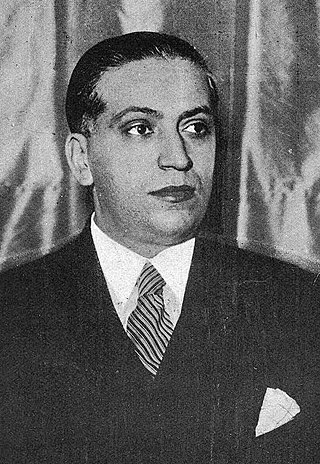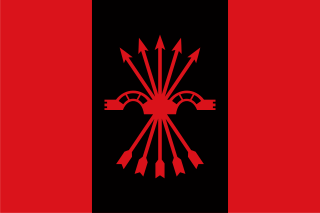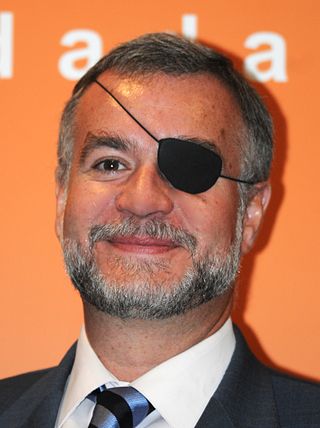José Luis Rodríguez Jiménez | |
|---|---|
| Born | 1961 Madrid |
| Occupation | Historian, senior lecturer |
| Employer | |
José Luis Rodríguez Jiménez (born 1961) is a Spanish historian, considered an expert in the history of right-wing extremism in Spain. [1]
José Luis Rodríguez Jiménez | |
|---|---|
| Born | 1961 Madrid |
| Occupation | Historian, senior lecturer |
| Employer | |
José Luis Rodríguez Jiménez (born 1961) is a Spanish historian, considered an expert in the history of right-wing extremism in Spain. [1]
Born in 1961 in Madrid, [2] [3] he earned a licentiate degree in history at the Complutense University of Madrid; he later obtained a PhD in the same centre in 1992 under the doctoral supervision of Antonio Fernández García reading a thesis dealing with the positions espoused by the Spanish far-right and the further evolution it experienced during the late francoist period and the Spanish transition to democracy. [n. 1] He is professor of Contemporary History at the King Juan Carlos University (URJC). [5]

José Calvo Sotelo, 1st Duke of Calvo Sotelo, GE was a Spanish jurist and politician. He was the minister of finance during the dictatorship of Miguel Primo de Rivera and a leading figure during the Spanish Second Republic. During this period. he became an important part of Spanish Renovation, a monarchist movement. Calvo Sotelo's assassination in July 1936 by the bodyguard of PSOE party leader Indalecio Prieto was an immediate prelude to the triggering of the Spanish military coup of July 1936 that was plotted since February 1936, the partial failure of which marked the beginning of the Spanish Civil War.
Young Force was the youth wing of Fuerza Nueva, the Spanish far-right nationalist party founded in 1966.

The National Council of the Movement, was an institution of the Franco dictatorship of a collegiate nature, which was subordinated to the Head of State. Originally created under the name of the National Council of FET and the JONS on 19 October 1937 in the midst of the Civil War, it would continue to exist until 1977, following the death of Francisco Franco and the dismantling of institutions of his regime.

The Spanish National Union was a conservative and traditionalist political party in Spain.

During 40 years of post-Francoist Spain there have been some 200 works published on Carlist history during the Franco regime ; there are some 100 authors who have contributed. The number of major studies – books or unpublished PhD works - stands at around 50, the rest are articles in specialized reviews. Except some 15 titles, almost all have been published in Spain. The interest was scarce in the late 1970s and early 1980s, it grew in the late 1980s and since the early 1990s it remains stable, with some 30 titles published every 5 years.

Falange Española de las JONS is a Spanish political party registered in 1976, originating from a faction of the previous Falange Española Tradicionalista y de las Juntas de Ofensiva Nacional Sindicalista. The word Falange is Spanish for phalanx. Members of the party are called Falangists. The main ideological bases of the party are national syndicalism, Third Position and ultranationalism.

Falange Española Independiente was a Spanish political party registered in 1977, originating from the Frente de Estudiantes Sindicalistas (FES), a student group of anti-Francoist falangists.

Movimiento Falangista de España is a Spanish political party registered in 1979. The party considers itself heir of classic Falangism, openly rejecting Francoism, originating from a split of the Círculos Doctrinarios José Antonio, led by Antonio Jareño. Currently the party only has activity in Cantabria.

Youth Front was a Spanish political youth organization and far-right militant group, sometimes considered a terrorist organization.

José Javier Esparza Torres is a Spanish journalist, essayist and cultural critic.
The Frente de Estudiantes Sindicalistas (FES) was a Spanish student group belonging to the Falangist minority opposition to the Francoist regime.
Jesús Palacios Tapias is a Spanish essayist who has authored several books about contemporary history of Spain. He was a member of the neo-nazi CEDADE, now disbanded.

Fernando José "Ferran" Gallego Margaleff is a Spanish historian and writer.
Isidro Juan Palacios Tapias is a Spanish editor, author, philologist and teacher of oratory. Linked to the Nouvelle Droite (ND), he was a member of the now disbanded neo-nazi CEDADE.
The Movimiento Español Sindicalista (MES) was a Spanish far-right political movement and predecessor of the Falange Española.
The history of the far-right in Spain dates back to at least the 1800s and refers to any manifestation of far-right politics in Spain. Individuals and organizations associated with the far-right in Spain often employ reactionary traditionalism, religious fundamentalism, corporate Catholicism, and fascism in their ideological practice. In the case of Spain, according to historian Pedro Carlos González Cuevas, the predominance of Catholicism played an essential role in the suppression of external political innovations such as Social Darwinism, positivism, and vitalism in Spanish far-right politics.

Licinio de la Fuente y de la Fuente was a Spanish Francoist politician who served as Minister of Labour from 1969 to 1975. Promoter of the Democracia Social party during the Spanish Transition, he was one of the "Magnificent Seven", the seven political leaders who founded the federation of People's Alliance (AP) in 1976.
The neocatólicos was a counter-revolutionary political tradition, faction or movement in late 19th-century Spain, emerged during the reign of Isabella II, akin to "Isabelline traditionalism" and "authoritarian conservatism", fusing anti-liberalism with the defence of the queen's dynastic legitimacy.
Libertad was a Spanish newspaper published in Valladolid between 1931 and 1979. Originally founded by the fascist leader Onésimo Redondo as a weekly of fascist, pro-Nazi and anti-Semitic ideology, during the Civil War it became a daily newspaper. It continued to be published until its disappearance in 1979, after the end of the Franco regime.
Luis Juan Francisco Benítez de Lugo y Ascanio Enrich was a Spanish athlete who presided over a total of 17 National Federations, including Swimming (1968–1972). He founded and directed around thirty companies and societies, but he is best known for being the 18th president of Atlético Madrid between 1952 and 1955.